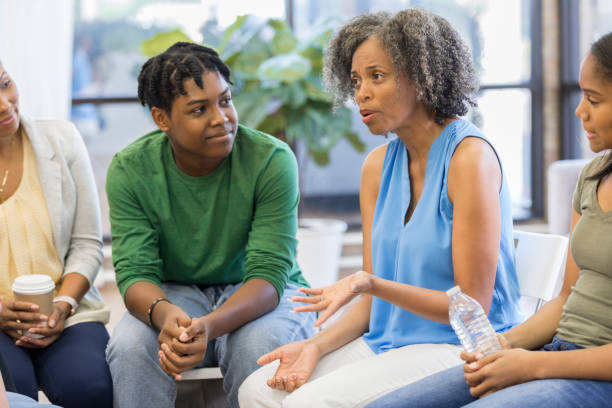Menopause is a major milestone in a woman’s life, yet it’s one of the most misunderstood and under-discussed topics in women’s health. For many women, it’s more than just “the end of periods”—it can bring physical discomfort, emotional upheaval, and even identity shifts. The silence surrounding menopause often leaves women unprepared, confused, or ashamed of the very natural changes happening in their bodies. Let’s break the silence and have an open conversation about what menopause really means—and how to manage it with strength, knowledge, and dignity.

What Is Menopause?
Menopause is defined as the time when a woman has not had a menstrual period for 12 consecutive months. It typically occurs between the ages of 45 and 55, although some women may experience it earlier due to genetics, surgery, or certain health conditions.
The Three Stages of Menopause
- Perimenopause: This stage begins several years before menopause. Hormone levels fluctuate, and women may start experiencing symptoms like irregular periods or hot flashes.
- Menopause: This is marked by 12 months without a menstrual cycle. Ovaries stop releasing eggs, and estrogen production drops significantly.
- Postmenopause: The years after menopause, when symptoms may lessen but health risks like osteoporosis or heart disease may increase.
Common Symptoms Women Experience
Menopause symptoms can range from mild to severe and vary greatly between individuals. Some may breeze through it with few discomforts, while others face intense daily challenges.
| Symptom | Description |
|---|---|
| Hot flashes | Sudden feelings of heat, often with sweating and a red face |
| Night sweats | Excessive sweating at night, disrupting sleep |
| Vaginal dryness | Decreased estrogen leads to dryness and discomfort |
| Mood swings | Emotional changes like irritability, sadness, or anxiety |
| Sleep problems | Difficulty falling or staying asleep |
| Memory issues | Forgetfulness or trouble concentrating, often called “brain fog” |
Why Menopause Affects More Than Just the Body
Menopause isn’t just a hormonal shift—it’s a psychological and emotional one too. Many women struggle with a changing sense of identity, especially if fertility has played a central role in their self-concept. Others may feel invisible or less valued as they age, especially in cultures that idolize youth.
In addition, hormonal changes can contribute to increased anxiety, depression, or a decrease in self-esteem. Understanding that these feelings are common—and treatable—is essential to maintaining emotional wellness.
Managing Menopause Naturally
While hormone replacement therapy (HRT) is a widely used treatment, many women prefer or complement it with natural strategies. Here are some proven ways to manage symptoms naturally:
1. Healthy Diet
A balanced diet rich in calcium, magnesium, vitamin D, and omega-3 fatty acids can reduce symptoms and protect bones.
- Eat leafy greens, salmon, almonds, and yogurt.
- Reduce caffeine, alcohol, and processed sugars that may trigger hot flashes.
2. Exercise Regularly
Physical activity helps with weight management, bone strength, and mental health.
- Try walking, swimming, or low-impact aerobics.
- Yoga and stretching can improve flexibility and reduce stress.
3. Herbal Remedies
Some women find relief in herbal supplements, though results vary.
- Black cohosh: May ease hot flashes and mood swings.
- Evening primrose oil: Used for hormonal balance.
- Red clover: Contains phytoestrogens that mimic estrogen.
Always consult a healthcare provider before starting herbal supplements, especially if you are on medication.
4. Mind-Body Techniques
- Meditation and mindfulness: Can reduce stress and improve sleep.
- Acupuncture: Some studies suggest it may relieve hot flashes.
When to Consider Medical Help
If your symptoms are affecting your quality of life, it’s okay to seek medical advice. Hormone Replacement Therapy (HRT) can be a safe and effective option for many women. There are also vaginal estrogen creams, antidepressants for mood swings, and other prescription treatments available.
Your doctor can help you weigh the benefits and risks based on your medical history.
Emotional Support and Community
The emotional journey of menopause can be just as significant as the physical one. You don’t have to go through it alone. Talking to other women, joining support groups, or even starting your own journal can make a big difference.
Tips for Partners and Families
- Listen without judgment—sometimes women just need to be heard.
- Be patient during mood swings or emotional moments.
- Encourage regular medical checkups and healthy habits.
Conclusion
Menopause is a powerful transition—not an ending, but a new beginning. While it brings undeniable challenges, it also offers an opportunity to reconnect with your body, reassess your life priorities, and emerge stronger. No woman should feel ashamed or silenced by menopause. Through education, community, and compassionate healthcare, every woman can navigate this chapter with confidence and clarity. It’s time we treat menopause not as a taboo, but as a natural and empowering part of life.